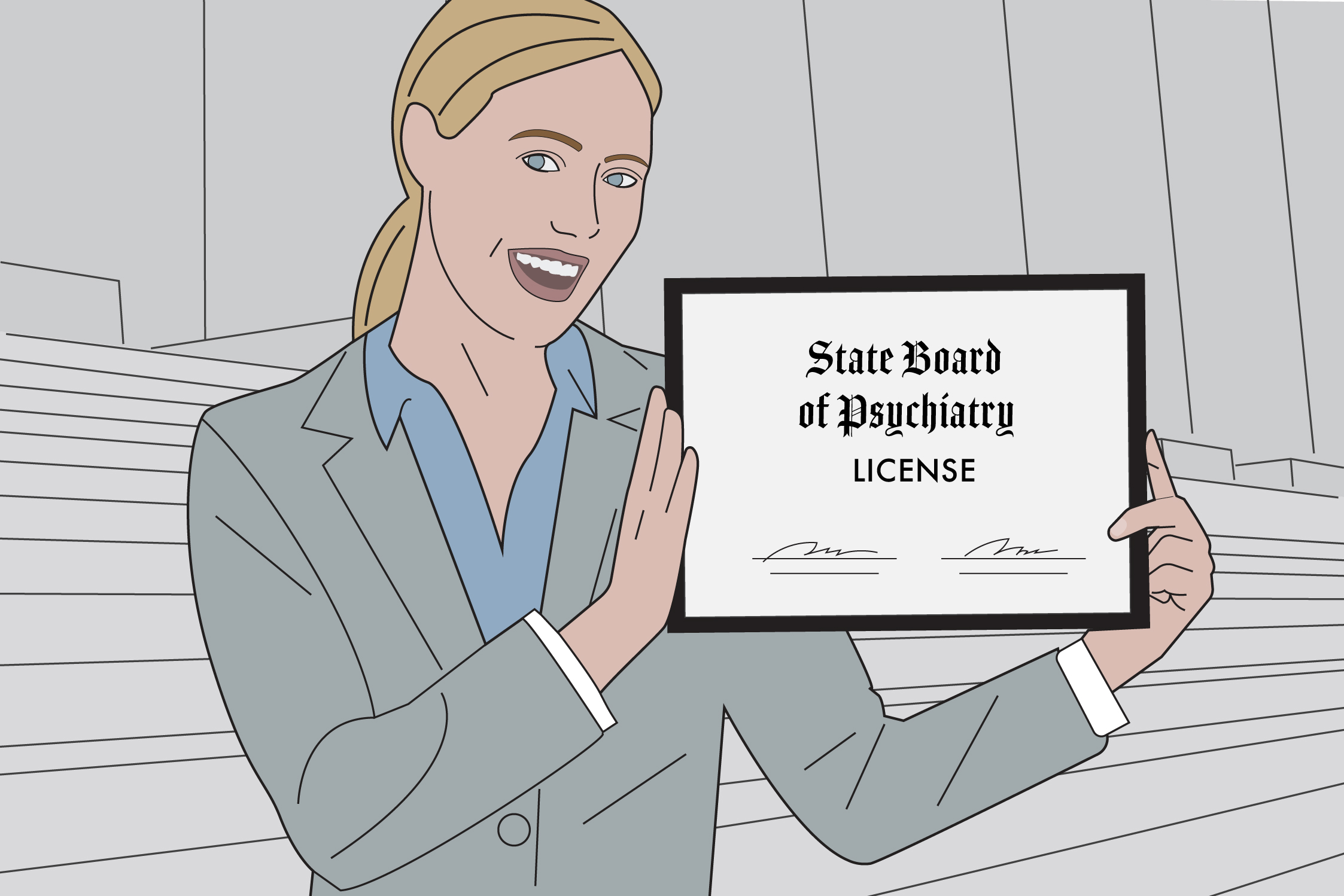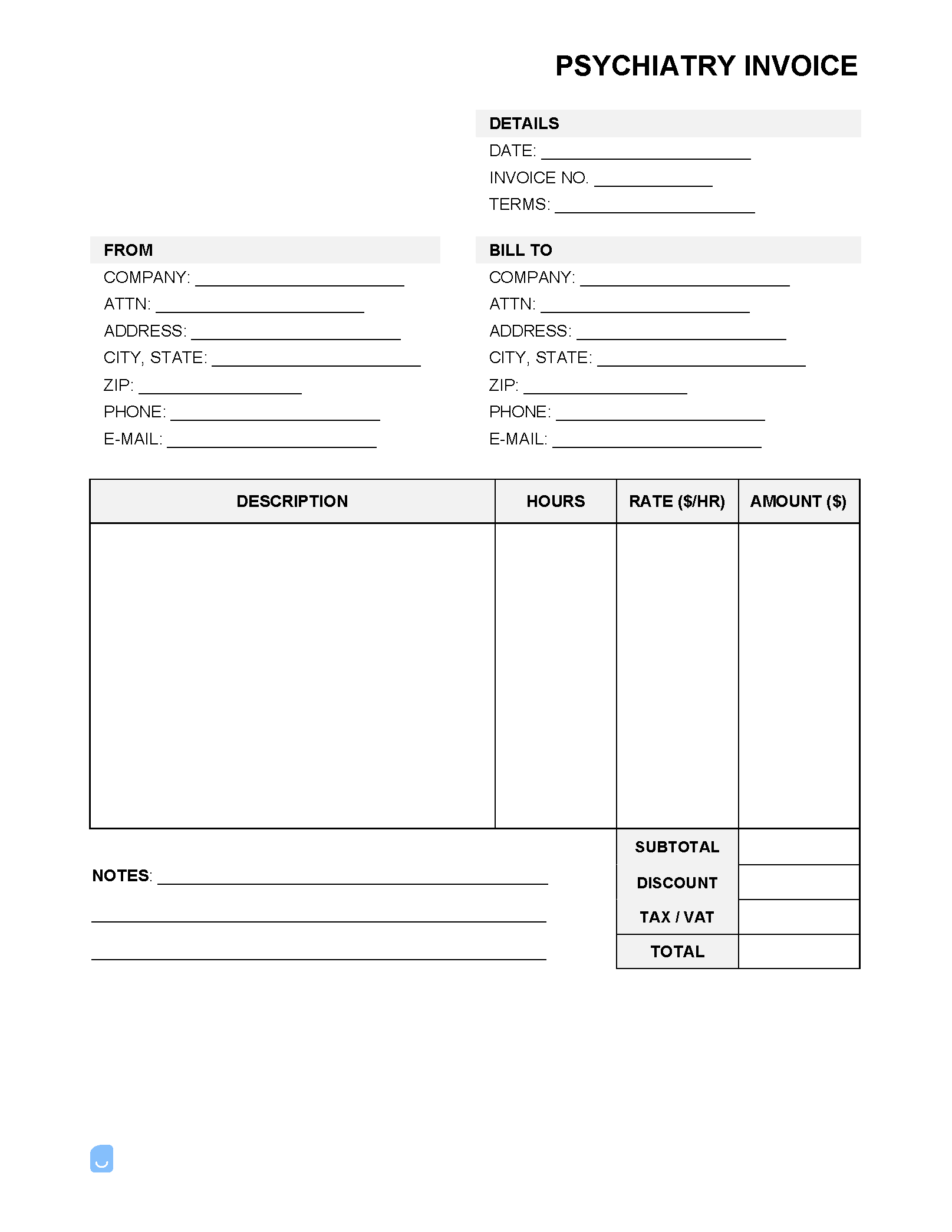A psychiatrist invoice is a billing document sent to patients that were treated for a range of mental health issues and disorders. Psychiatrists charge their services on a per-rate basis, often offering fifteen (15), thirty (30), or one (1) hour-long consultations. In the medical field, keeping past treatments and billing documents organized is essential for both safeguarding client’s information as well as maintaining accurate accounting information for tax purposes. It is recommended that psychiatric practices utilize a digital means to reduce outstanding payments (accounts receivables) and to offer their clients the ability to make instantaneous payments.
Psychiatrist vs. Psychologist
The terms ‘psychiatrist’ and ‘psychologist’ are frequently used interchangeably due to the similarity of their names and their professions being devoted to the field of mental health. Apart from that, the two professions are significantly different, as is explained below.
- Psychiatrists – Licensed medical doctors that specialize in the diagnosing and treatment of mental disorders. Unlike psychologists, psychiatrists can prescribe medications and are fully qualified to assess both mental and physical issues. Being certified physicians, psychiatrists have access to medical and laboratory testing equipment which they can use to gain a thorough understanding of the patient’s mental status.
- Psychologists – Psychologists have earned their doctoral degrees, and come from backgrounds rooted in either research-based studies (if they have a Ph.D.) or a clinical background if they have earned their Psy.D. Because psychologists are not trained from a medical perspective, they test patients using predominantly psychological-based tests, such as intelligence tests (WAIS, WISC, etc.) or personality tests (inkblot, TAT, or MMPI).
How to Become a Psychiatrist
Those looking to become a psychiatrist will need to complete four (4) major milestones before they begin diagnosing and treating patients. These steps are the following:
Step 1 – Bachelor’s Degree
 Completing a Bachelor’s degree program is the first step for hopeful psychiatrists. There is no single college major that is required in order to be accepted into medical school, although candidates should focus their studies on those related to biology, mathematics, and physics. Maintaining a competitive GPA as well as participating in extracurriculars (with those relating to hospitals or the medical field being a plus) will help to boost the student’s medical school applications.
Completing a Bachelor’s degree program is the first step for hopeful psychiatrists. There is no single college major that is required in order to be accepted into medical school, although candidates should focus their studies on those related to biology, mathematics, and physics. Maintaining a competitive GPA as well as participating in extracurriculars (with those relating to hospitals or the medical field being a plus) will help to boost the student’s medical school applications.
Step 2 – Medical School
 Applying for medical school should be taken very seriously by students, who will be studying and taking the Medical College Admissions Test (MCAT). Upon being accepted, it typically four (4) years for students to complete medical school, where psychiatry students will begin learning clinical-focused work beginning in their second (2nd) year of study.
Applying for medical school should be taken very seriously by students, who will be studying and taking the Medical College Admissions Test (MCAT). Upon being accepted, it typically four (4) years for students to complete medical school, where psychiatry students will begin learning clinical-focused work beginning in their second (2nd) year of study.
Step 3 – Residency
 Completing a residency takes another four (4) years of study. During residency, graduates will focus on a specialty within psychiatry, which according to the Accreditation Council for Graduate Medical Education (ACGME), can include adolescent psychiatry, geriatric psychiatry, brain injury medicine, consultation-liaison psychiatry, and sleep medicine, to name a few. Upon completing residency, graduates will be ready to become licensed and start working in the field.
Completing a residency takes another four (4) years of study. During residency, graduates will focus on a specialty within psychiatry, which according to the Accreditation Council for Graduate Medical Education (ACGME), can include adolescent psychiatry, geriatric psychiatry, brain injury medicine, consultation-liaison psychiatry, and sleep medicine, to name a few. Upon completing residency, graduates will be ready to become licensed and start working in the field.
Step 4 – Licensing
 The final step in becoming a psychiatrist is to become licensed in the state in which the psychiatrist will be operating. Licensing requirements are state-specific due to examinations containing questions relating to each state’s medical standards and regulations.
The final step in becoming a psychiatrist is to become licensed in the state in which the psychiatrist will be operating. Licensing requirements are state-specific due to examinations containing questions relating to each state’s medical standards and regulations.
